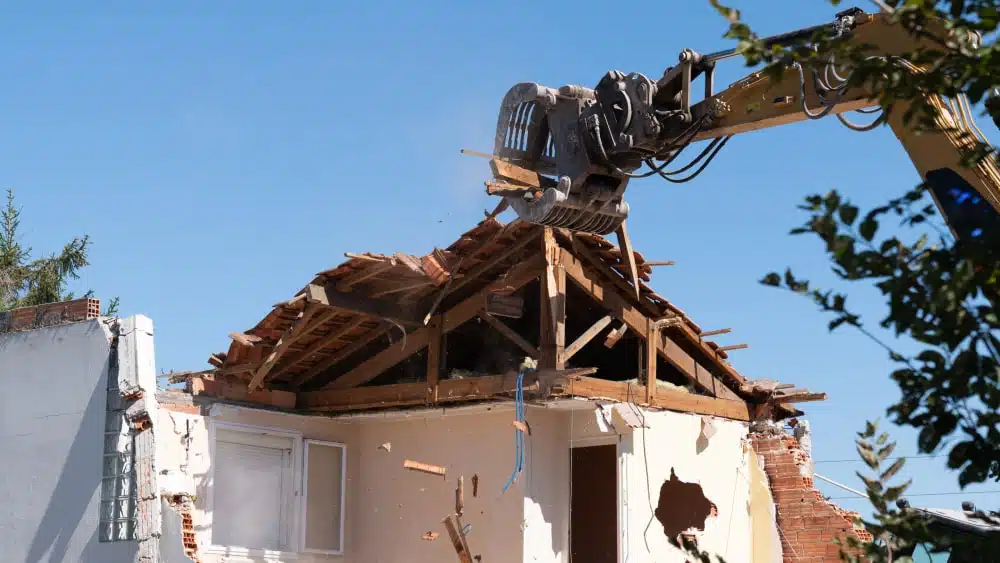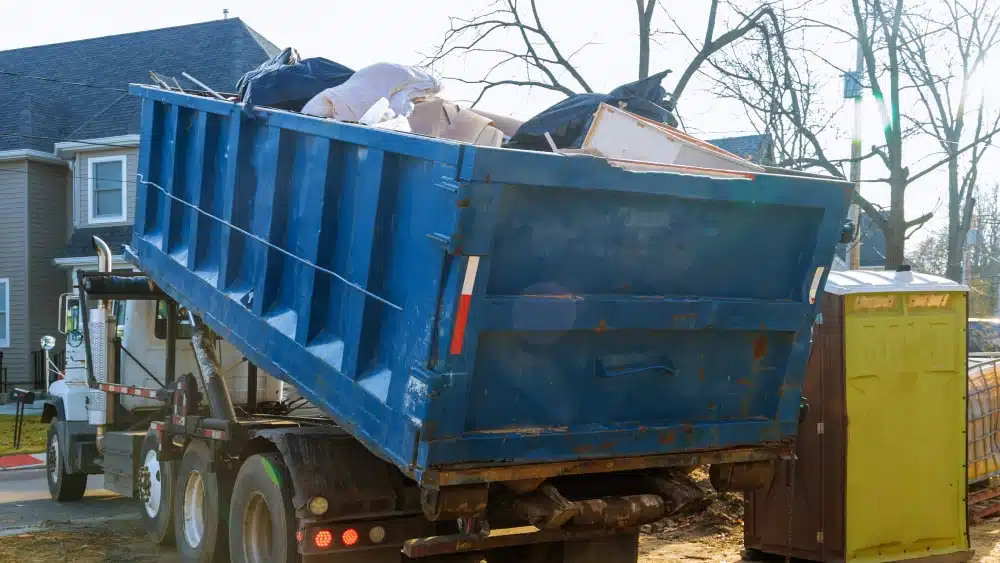Securing the right permits, disconnecting all utilities, and then taking a wrecking ball to your old family home — from the initial paperwork to bulldozing away debris, home demolition involves a lot of heavy lifting. Therefore, hiring the right demolition contractor is crucial in your home demolition journey.
Home demolition isn’t a DIY project. Demolition sites are dangerous areas, so you’ll need a qualified team that prioritizes safety, expertly follows local regulations, and has a great deal of experience so you know your tear-down project is in good hands.
This is an industry that’s chock-full of contractors claiming to be the best in the business, but your job is to hire the right team for your home demolition. If you’re trying to figure out how to find the right contractor for your home demolition, here’s a look at the seven key factors you should zero in on.

Check Their Credentials (Including Their License and Experience)
As you’re sifting through contractors’ websites and pamphlets, make sure the options you’re considering are properly licensed in your region, and that the team has the right experience for the job.
You’ll be counting on your contractor to safely secure the site, keep the community from harm, and demolish the property without any complications. Doing your due diligence with this step is crucial when the stakes are this high.
The National Demolition Association suggests that consumers conduct a thorough background check for their shortlist of top contenders, which includes:
- Checking if the professional is licensed as a demolition contractor and ensuring their experience is relevant to your home demolition project. To operate as a demolition contractor, you must have the licenses required by the counties, municipalities, and states you’re working in, so your contractor should have these readily available to show you. If their license number is missing on their website, quote sheets, or contracts, this is a red flag. (Keep in mind, regulations vary from state to state.)
- Checking if the contractor has any regulatory violations with governing bodies, such as the Environmental Protection Agency and the Occupational Safety and Health Administration. You’re looking for a contractor with a clean track record. And if they’ve faced complaints, pay attention to how the contractor handled allegations.
- Checking your contractor’s experience, including a request for a list of similar projects with contact names and phone numbers for verifying details.
- Verifying that the contractor has the manpower, equipment, experience, and financial ability to handle your project.
And once you’ve picked your demolition contractor, the NDA also suggests this checklist to cover your bases:
- Ask for the step-by-step approach your contractor will take to perform the work to ensure you’re on the same page.
- Ask for resumes of the team involved in managing the project, both on-site and off-site, and check their experience. If you can’t appropriately evaluate this information, the NDA recommends hiring someone qualified to do so.
Make Sure They’re Adequately Insured for Home Demolition Work
Homeowner’s insurance, car insurance, life insurance — we all need insurance policies to cover our backs in case something goes awry. This applies to home demolition contractors too, especially since they’re putting themselves, their employees, and their equipment at risk while on the job every day.
Triple-check that your contractor has adequate insurance for home demolition and get clear on what the insurance does and does not cover. This will be an important caveat in case of accidents, delays, or other interruptions. Without insurance, your contractor could argue that it was your responsibility to provide a safe work zone, leaving you with the tab to pay the damages.
Request their insurance policy and forward these documents to your insurance provider to verify that you’re in the clear.
Take Stock of Areas of Specialization
Home demolition projects aren’t one-size-fits-all. Some contractors focus solely on demolishing large-scale commercial buildings, while others are called in to deal with tearing down aging homes with hazardous materials like asbestos, lead, or mold. (If you’re tearing down an antiquated home, it’s worth searching for demolition contractors who are fully licensed to deal with the hazardous materials that may be on your property.)
You’ll notice truly experienced contractors will hone in on a few specialties in home demolition, whether that’s destroying steel-framed buildings or tearing down homes in a sustainable way, primarily using deconstruction methods.
Your job in this step is to try to find a contractor with the precise skills and experience required to get your home demolition job done as smoothly as possible. Ask them if they’ve managed a project like yours before, and request references from past clients if they have.
Don’t shy away from making a few calls to their references, either. You’ll want the peace of mind that the contractor not only completed the work but that they did so to their previous clients’ satisfaction.
While one contractor may offer you a lower price, you may prefer to pay a premium for the contractor that’s a seasoned pro for your specific job.
Define Your Project Needs

Detail all the work you need to be done, so you can provide this information to the contractors on your shortlist.
If you’re dealing with a straightforward home demolition — free from hazardous materials — your list of needs may be concise, but your contractor will still need key information, including:
- House square footage, so they know how big the home is that you’d like to demolish.
- Materials used to build the home, so they’re aware of what may be required to dismantle it.
- Whether you’d like to keep the foundation or not, including how thick the foundation is.
- Accessibility, including proximity to neighbors, landscaping, and access to roads for large machinery.
- Extras that require demolition, including features like a swimming pool, backyard patio, front porch, or garage.
Ultimately, it’s these factors — especially the size of your home — that will help your contractor provide an accurate quote for the job.
Determine Your Budget
Between tearing down your home and rebuilding it, you’ll need to do some careful number-crunching to figure out how much you’ll be spending.
Your bottom line is important to define before you hire a demolition contractor. You don’t want to choose the cheapest option that may not give you peace of mind, but you also need to make sure you’re choosing a contractor that fits your budget.
Keep in mind, the National Association of Home Builders says the average single-family home in 2021 was about 2,338 square feet. With these parameters, industry estimates are roughly $8,000 to $37,000 for home demolition, depending on where you live in the country, the size of your home, and what’s needed to get your plot of land back to baseline.
With a set budget ready, you’ll be able to talk numbers confidently with contractors. Make sure you have a buffer of savings to account for unforeseen costs that may crop up, too.
Obtain Quotes for Comparison Shopping
The best way to make sure you’re getting a reasonable price is to obtain multiple quotes for the job.
While it’s tempting, don’t just compare the bottom-line cost. Consider each contractor’s experience, expertise, and references, along with what they’re promising in their scope of work, terms for payment, and timelines and scheduling.
Expect the contractor to visit the home for an inspection before providing you with a written estimate for their work.
When you’ve picked the contractor you’d like to move forward with, make sure the written contract matches what they’ve quoted you in their initial estimate.
The contract should define what work will be done, how many team members will be involved, the materials and equipment that will be used, a payment schedule, and a scheduling timetable so both parties know when the project will begin and end.
Before you sign on the dotted line, ensure you understand the contract’s ins and outs and that you’re happy with each line in the scope of work. Ask follow-up questions if you need clarification on some details from your contractor.
Monitor the Home Demolition as It Progresses
While you can’t frequently show up on-site with a hard hat on, check in on the progress and stay in regular communication with your contractor.
The onus is on both of you to ensure the work is being done on time, that all permits are prominently displayed at the site, and that the site and your neighbors are kept safe.
You should be cautious with any contractors that insist on large payments upfront. You and your contractor will have brokered a staggered payment schedule outlined in your contract so that you’re only paying for work that’s completed.

You’ll need to do plenty of admin work here — keep track of your contract, invoices, bills, and payment receipts, along with any correspondence between you and your contractor. You can also take photos of the work as it’s being done for your records.

Carmen Chai is an award-winning Canadian journalist who has lived and reported from major cities such as Vancouver, Toronto, London and Paris. For NewHomeSource, Carmen covers a variety of topics, including insurance, mortgages, and more.
 Best Tiny Home Builders in Vermont
Best Tiny Home Builders in Vermont